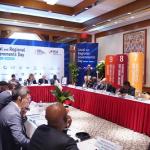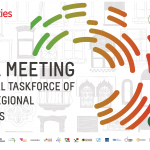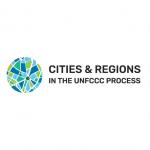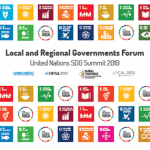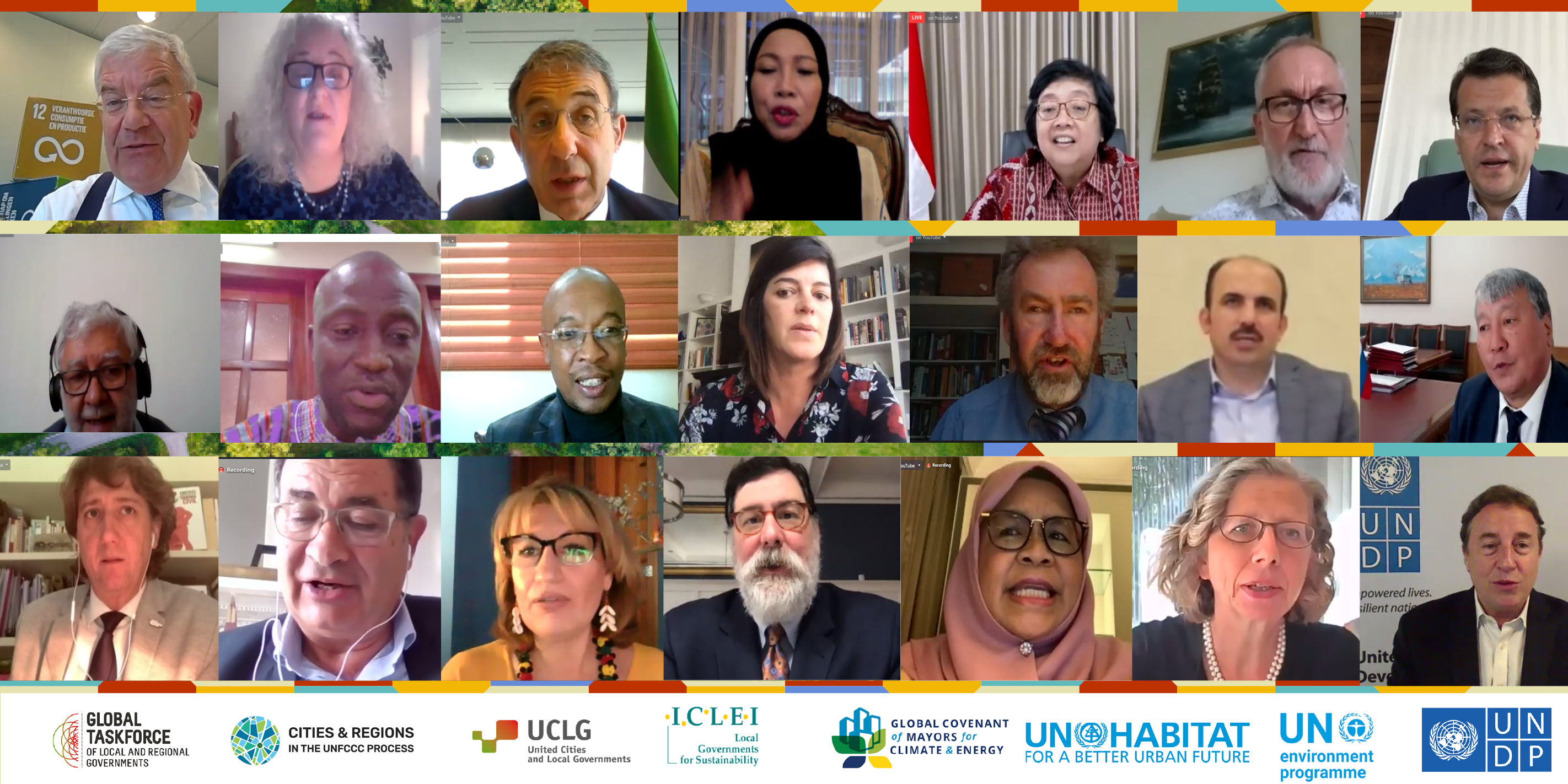
In the framework of the UCLG Executive Bureau, UCLG facilitated a High-Level dialogue the Global Taskforce, facilitated by UCLG and together with UNEP, UN-Habitat, UNDP, ICLEI and the Global Covenant of Mayors, and with representatives from CEMR, CLGF, Climate Chance, the Global Covenant of Mayors, ICLEI, UCLG, UCLG Africa, and UCLG ASPAC, held a Ministerial Dialogue focusing on increasing coordination efforts between local, regional and national governments for a more effective implementation of the Climate Paris Agreements.
The 5-hour long event gathered 300 participants, including 50 panelists, with the participation of the heads of 3 United Nations agencies (UNEP, UN-Habitat and UNDP), Ministers from Italy, Indonesia, Ivory Coast, Ethiopia, South Africa, Chile, and over 25 Mayors and Governors, from all world regions, emphasized the need to work together in order to achieve the climate agreements.
“In the next few years, we will have to make hard choices. One in which we will return to a development pathway which will continue to polarize us and undermine the writing of the social contract or to transform ourselves.” Achim Steiner, UNDP Administrator
“Cities are on the frontline of impact, but also of the solutions. Cities have already shown tremendous leadership. Especially where countries have not acted, we have seen cities engaged in climate contributions. Inger Andersen, Executive Director, UN Environment Programme
“The battle for climate will be won or lost in cities. Improving our fight on climate should go with improving projects on the ground. It is critical for governments and immunities to be involved, which is why LRGs need to play a role on climate awareness initiatives” Maimunah Mohd. Sharif Executive Director, UN Habitat
UCLG President Dr. Mohamed Boudra underscored the greater links between climate and the debate on multilateralism and peace. The contributions of the local and regional governments movement has been and remains fundamental in building of world of solidarity and justice.
“Our commitment as a network of cities and regions is unwavering. It is together in the Global Taskforce that we will continue to win the battle, and I wish to thank ICLEI, as the focal point for local governments, for their unwavering commitment.” Dr. Mohamed Boudra, President of UCLG.
Ministers and local, regional representatives made it clear that climate change continues to be a dramatic threat to sustainable development, already causing an unprecedented impact that disproportionately burden the poorest, marginalized and most vulnerable part of the population. The discussions made clear that it is “one decade” window of opportunity, especially in the context of the current universal crisis.
Discussions reaffirmed that cities are places where most of fighting climate change innovation happens and the debate confirmed the need to include the contribution from cities, regions and territories to the National Determined Contributions (NDCs).
In too many countries, the process of inclusion of local and regional governments is not considered enough in the process of elaboration of NDCs, or sometimes the level of consultation is merely cosmetic. This event highlighted existing efforts and practises and identified opportunities for vertical integration around the process of elaboration of NDCs, happening at national, regional and local levels.
“The President of South Africa announced it would finalise its just transition plan, and enhance mitigation initiatives by 2020. Our country has further incorporated Nationally Determined Contributions into its mid-term strategy” Mpho Parks Tau, Vice Minister of Cooperative Governance and Traditional Affairs, South Africa
The High-Level Dialogue established a fruitful conversation between Mayors and Ministers and allowed to boost opening channels of communication and trust between the different levels of government, keeping in mind the need to raise the global ambition and accelerate action implementation. Whereas ministers shared existing practises to foster multilevel governance, Mayors emphasised the need to include our constituencies formal contributions in mitigation, adaptation and transition into the NDCs.
“Climate action is at the same order of priority as gender, social safety nets and poverty alleviation. We have developed subnational guidance for implementation and tools for monitoring.” Siti Nurbaya Bakar, Minister of Environment and Forestry, Indonesia
Participants acknowledged the continuous efforts of the Local Governments and Municipal Authorities (LGMA) Roadmap and the legacy of the local and regional governments achievements in the previous COPs. Collaborative and integrated local action is critical to address the gap between national commitments and the goals of the Paris Climate Agreement – and was recognised through the UNFCCC Talanoa Dialogue process and the local government led Bonn-Fiji Accord prepared at COP 23.
“Local leadership has been present at all times where there is an opportunity to do something great. It is now time to make representative policies, that lessen the effects to the planet, that reduce our carbon footprint while still maintaining our cities unique. Bill Peduto, Mayor of Pittsburgh, ICLEI board member
The networks gathered within the Global Taskforce are committed to action that can be achieved through the implementation of policies and projects at a local level and through collaborative action between all levels of government. Cities are reporting on their progress and commitments to climate action by emphasizing adaptation and mitigation measures as increased access to clean and affordable energy. These territorial contributions are essential to achieve the ambition commitments taken by member states in Paris.
Participants confirmed the need to establish a consistent definition for and guidance around the possible contribution that regional and local governments can make towards the implementation of the Paris Climate Agreement. Through this process we will endeavour to give visibility to the efforts taken by local and regional governments, but also to find ways to increase ambition as part of the NDCs.
UCLG Co-President, and Mayor of Utrecht, Jan Van Zanen, made a plea for the local, regional and national spheres to work in collaboration, in order to fulfil our role (of local and regional governments) as guardians of the global development agendas.
The gathering provided an opportunity to debate the important consequences of current world crisis, as well as the significant reduction in Greenhouse Gas emissions and air quality improvement, with staggering numbers proving how the environment recovers when the most harmful human activities come to a sudden stop.
Local, regional and national representatives mentioned that the recovery will need to ensure that this does not deliver a backlash in environmental impacts and greenhouse gas emissions. Instead, this must be seen as a unique opportunity to realize that a return to business as usual post-crisis would not only be a failure in the race against climate change but also for human health.
The last round-table emphasised the opportunity for Regional and Local Contributions (RLCs) to be framed into the context of stimulus measures to boost a “green recovery.” In thinking of new ways to rebuild our economies and our societies to recover from this crises, national governments will also need to leverage their climate-related commitments as useful tools for achieving economic prosperity, leveraging their NDCs and long-term strategies to help guide these recovery strategies, and vice versa.
“LRGs are sending a loud message to national governments that city and region governments are ambitious and that only together can we win the race to zero.” Nigel Topping, UK High Level Climate Action Champion COP 26
Wrapping up, panellists agreed on the need to continue mobilising local governments action to contribute to Paris +5, and through elements to be considered in the elaboration of NDCs to make sure that local and regional governments are included and aligned closely with COVID19 recovery strategies.
“We have the commitment to delivering the sustainable development goals, and we are convinced that delivering the Paris agreement will make the NDCs more sustainable” Steven Heddle, Environment and Economy Spokesperson, Convention of Scottish Local Authorities COSLA
The High-Level Event triggered the need to kick off a series of dialogues around RLDCs over the following months and ultimately lead to a final report with recommendations and proposals to include the contribution of local and regional governments in the NDCs in the context of the COVID 19 crisis.
The outcomes will be transmitted to the UNEP Committee of Representatives meeting on 9 June.
In the framework of the UCLG Executive Bureau, UCLG facilitated a High-Level dialogue the Global Taskforce, facilitated by UCLG and together with UNEP, UN-Habitat, UNDP, ICLEI and the Global Covenant of Mayors, and with representatives from CEMR, CLGF, Climate Chance, the Global Covenant of Mayors, ICLEI, UCLG, UCLG Africa, and UCLG ASPAC, held a Ministerial Dialogue focusing on increasing coordination efforts between local, regional and national governments for a more effective implementation of the Climate Paris Agreements.
The 5-hour long event gathered 300 participants, including 50 panelists, with the participation of the heads of 3 United Nations agencies (UNEP, UN-Habitat and UNDP), Ministers from Italy, Indonesia, Ivory Coast, Ethiopia, South Africa, Chile, and over 25 Mayors and Governors, from all world regions, emphasized the need to work together in order to achieve the climate agreements.
“In the next few years, we will have to make hard choices. One in which we will return to a development pathway which will continue to polarize us and undermine the writing of the social contract or to transform ourselves.” Achim Steiner, UNDP Administrator
“Cities are on the frontline of impact, but also of the solutions. Cities have already shown tremendous leadership. Especially where countries have not acted, we have seen cities engaged in climate contributions. Inger Andersen, Executive Director, UN Environment Programme
“The battle for climate will be won or lost in cities. Improving our fight on climate should go with improving projects on the ground. It is critical for governments and immunities to be involved, which is why LRGs need to play a role on climate awareness initiatives” Maimunah Mohd. Sharif Executive Director, UN Habitat
UCLG President Dr. Mohamed Boudra underscored the greater links between climate and the debate on multilateralism and peace. The contributions of the local and regional governments movement has been and remains fundamental in building of world of solidarity and justice.
“Our commitment as a network of cities and regions is unwavering. It is together in the Global Taskforce that we will continue to win the battle, and I wish to thank ICLEI, as the focal point for local governments, for their unwavering commitment.” Dr. Mohamed Boudra, President of UCLG.
Ministers and local, regional representatives made it clear that climate change continues to be a dramatic threat to sustainable development, already causing an unprecedented impact that disproportionately burden the poorest, marginalized and most vulnerable part of the population. The discussions made clear that it is “one decade” window of opportunity, especially in the context of the current universal crisis.
Discussions reaffirmed that cities are places where most of fighting climate change innovation happens and the debate confirmed the need to include the contribution from cities, regions and territories to the National Determined Contributions (NDCs).
In too many countries, the process of inclusion of local and regional governments is not considered enough in the process of elaboration of NDCs, or sometimes the level of consultation is merely cosmetic. This event highlighted existing efforts and practises and identified opportunities for vertical integration around the process of elaboration of NDCs, happening at national, regional and local levels.
“The President of South Africa announced it would finalise its just transition plan, and enhance mitigation initiatives by 2020. Our country has further incorporated Nationally Determined Contributions into its mid-term strategy” Mpho Parks Tau, Vice Minister of Cooperative Governance and Traditional Affairs, South Africa
The High-Level Dialogue established a fruitful conversation between Mayors and Ministers and allowed to boost opening channels of communication and trust between the different levels of government, keeping in mind the need to raise the global ambition and accelerate action implementation. Whereas ministers shared existing practises to foster multilevel governance, Mayors emphasised the need to include our constituencies formal contributions in mitigation, adaptation and transition into the NDCs.
“Climate action is at the same order of priority as gender, social safety nets and poverty alleviation. We have developed subnational guidance for implementation and tools for monitoring.” Siti Nurbaya Bakar, Minister of Environment and Forestry, Indonesia
Participants acknowledged the continuous efforts of the Local Governments and Municipal Authorities (LGMA) Roadmap and the legacy of the local and regional governments achievements in the previous COPs. Collaborative and integrated local action is critical to address the gap between national commitments and the goals of the Paris Climate Agreement – and was recognised through the UNFCCC Talanoa Dialogue process and the local government led Bonn-Fiji Accord prepared at COP 23.
“Local leadership has been present at all times where there is an opportunity to do something great. It is now time to make representative policies, that lessen the effects to the planet, that reduce our carbon footprint while still maintaining our cities unique. Bill Peduto, Mayor of Pittsburgh, ICLEI board member
The networks gathered within the Global Taskforce are committed to action that can be achieved through the implementation of policies and projects at a local level and through collaborative action between all levels of government. Cities are reporting on their progress and commitments to climate action by emphasizing adaptation and mitigation measures as increased access to clean and affordable energy. These territorial contributions are essential to achieve the ambition commitments taken by member states in Paris.
Participants confirmed the need to establish a consistent definition for and guidance around the possible contribution that regional and local governments can make towards the implementation of the Paris Climate Agreement. Through this process we will endeavour to give visibility to the efforts taken by local and regional governments, but also to find ways to increase ambition as part of the NDCs.
UCLG Co-President, and Mayor of Utrecht, Jan Van Zanen, made a plea for the local, regional and national spheres to work in collaboration, in order to fulfil our role (of local and regional governments) as guardians of the global development agendas.
The gathering provided an opportunity to debate the important consequences of current world crisis, as well as the significant reduction in Greenhouse Gas emissions and air quality improvement, with staggering numbers proving how the environment recovers when the most harmful human activities come to a sudden stop.
Local, regional and national representatives mentioned that the recovery will need to ensure that this does not deliver a backlash in environmental impacts and greenhouse gas emissions. Instead, this must be seen as a unique opportunity to realize that a return to business as usual post-crisis would not only be a failure in the race against climate change but also for human health.
The last round-table emphasised the opportunity for Regional and Local Contributions (RLCs) to be framed into the context of stimulus measures to boost a “green recovery.” In thinking of new ways to rebuild our economies and our societies to recover from this crises, national governments will also need to leverage their climate-related commitments as useful tools for achieving economic prosperity, leveraging their NDCs and long-term strategies to help guide these recovery strategies, and vice versa.
“LRGs are sending a loud message to national governments that city and region governments are ambitious and that only together can we win the race to zero.” Nigel Topping, UK High Level Climate Action Champion COP 26
Wrapping up, panellists agreed on the need to continue mobilising local governments action to contribute to Paris +5, and through elements to be considered in the elaboration of NDCs to make sure that local and regional governments are included and aligned closely with COVID19 recovery strategies.
“We have the commitment to delivering the sustainable development goals, and we are convinced that delivering the Paris agreement will make the NDCs more sustainable” Steven Heddle, Environment and Economy Spokesperson, Convention of Scottish Local Authorities COSLA
The High-Level Event triggered the need to kick off a series of dialogues around RLDCs over the following months and ultimately lead to a final report with recommendations and proposals to include the contribution of local and regional governments in the NDCs in the context of the COVID 19 crisis.
The outcomes will be transmitted to the UNEP Committee of Representatives meeting on 9 June.
Furter information
- Read more about the UCLG Executive Bureau here

